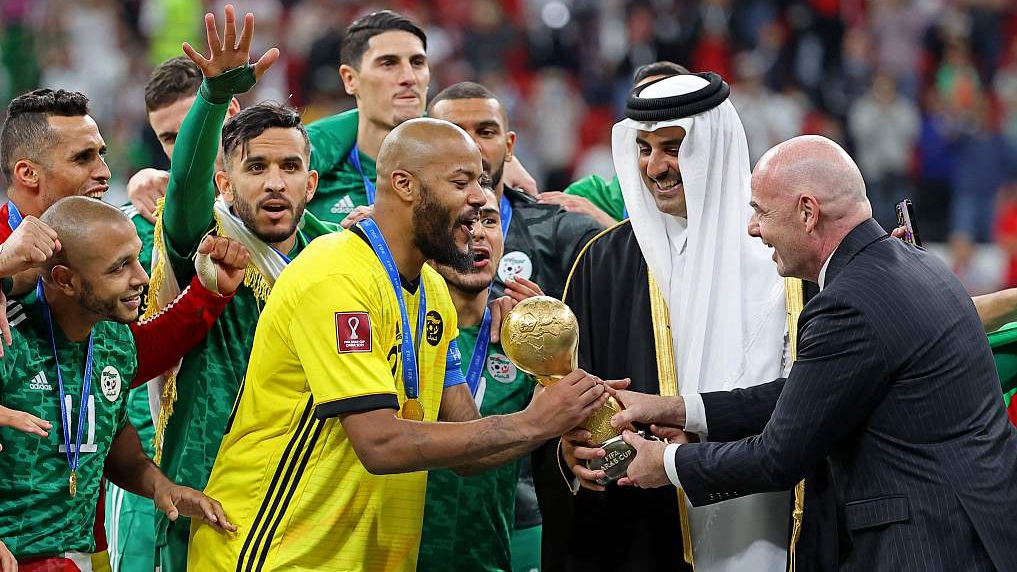
FIFA President Gianni Infantino (R) present the trophy to the Algerian team after its victory in the FIFA Arab Cup 2021 final at the Al-Bayt stadium in Al-Khor, Qatar, December 18, 2021. /CFP
FIFA President Gianni Infantino (R) present the trophy to the Algerian team after its victory in the FIFA Arab Cup 2021 final at the Al-Bayt stadium in Al-Khor, Qatar, December 18, 2021. /CFP
FIFA on Monday claimed staging the World Cup every two years would offer enormous financial benefits for its member federations as President Gianni Infantino expressed hope that the highly controversial plans will not be derailed by opposition from Europe and South America.
Infantino was speaking after FIFA held a virtual global summit with federations to discuss the project, although there was no vote on the subject on Monday and he refused to confirm if there would be one at the next FIFA Congress on March 31, 2022.
Football's global body published findings from two separate feasibility studies which it claimed showed there would be "a strong upturn in football's economic situation" if the World Cup was held as a biennial tournament rather than the current four-year cycle for the men's and women's competitions.
One study, by market researchers Nielsen, estimated that approximately $4.4 billion of additional revenues would be generated over four years, with income from gate receipts, media rights and sponsorship increasing from $7 billion to $11.4 billion.
To help convince its 211 member federations, FIFA vowed to hand over an extra $19 million every four years to each one, with the amount the same for major federations such as Brazil and France as it would be for Andorra or Guam.
Each member would get "around $16 million" allocated from a "Solidarity Fund" of some $3.5 billion in the first four years of the reformed calendar, as well as an increase in funding via its FIFA Forward program from the current $6 million to $9 million.
However, FIFA did not reveal the methodology used for the study, at a time when the desire of broadcasters to keep paying more for rights has been questioned by experts in football finance, and it offered no details as to the potential repercussions for domestic leagues or continental tournaments.

Kylian Mbappe of France celebrates with the World Cup Trophy following his side's victory in the 2018 final at Luzhniki Stadium in Moscow, Russia, July 15, 2018. /CFP
Kylian Mbappe of France celebrates with the World Cup Trophy following his side's victory in the 2018 final at Luzhniki Stadium in Moscow, Russia, July 15, 2018. /CFP
In contrast to its own studies, a report commissioned by European football's governing body UEFA recently estimated a shortfall of between 2.5 and 3 billion euros ($2.8-3.4 billion) over four years for European federations if FIFA adopts its plan.
"We have just finished a feasibility study of over 700 pages. It is very thorough, so maybe some will change their minds," Infantino said about the opposition to the project from Doha, where he gave a press conference alongside Arsene Wenger, FIFA's head of global development who has championed the biennial proposal.
"There is a lot of opposition and there is as well a lot of voices in favor, and FIFA is a global organizing body, so we need to really try to combine all these different points of view."
Only eight countries have ever won the men's World Cup since it was first held in 1930, and there has never been a winner from outside Europe or South America.
These confederations will provide more than half the teams for next year's World Cup in Qatar, which is due to be the last with 32 teams before the competition is expanded to feature 48 nations from 2026.
UEFA, as well as leading European clubs and leagues, have all united in opposition to the biennial World Cup plans.
In South America, CONMEBOL rejected the proposal, and in the meantime it has become a close ally of UEFA. Last week, it emerged that South America's 10 nations could join the UEFA Nations League after 2024.
"I don't believe we are making enemies. My role as FIFA president is to try to bring everyone on board," said Infantino, insisting that "the prestige of a competition like the World Cup will not be undermined by it becoming more frequent."
"I think everyone agrees that the current situation is not satisfactory, everyone sees the gap is getting bigger and bigger between a few who have it all, and others who have nothing."
The plans offer the chance for more countries from across the globe to take part in a World Cup, and the Confederation of African Football (CAF) has given its backing. The CAF has 54 member federations but only five will qualify for next year's tournament in Qatar.
Source(s): AFP

